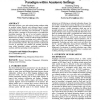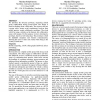170 search results - page 27 / 34 » A Practical Attack to De-anonymize Social Network Users |
SIGCPR
2006
ACM
15 years 7 months ago
2006
ACM
Podcasting represents a new and exciting learning paradigm within an academic setting. Materials such conference reports, research manuscripts, and course lectures can be recorded...
127
Voted
CIKM
2005
Springer
15 years 7 months ago
2005
Springer
Can we use social networks to combat spam? This paper investigates the feasibility of MailRank, a new email ranking and classification scheme exploiting the social communication ...
98
Voted
CHI
2002
ACM
16 years 2 months ago
2002
ACM
We introduce the Hocman prototype, supporting mobile group collaboration among motorcyclists. The design is based on findings from a field study. The motorcyclists are a group wit...
120
Voted
JNCA
2007
15 years 1 months ago
2007
Anomaly detection holds great potential for detecting previously unknown attacks. In order to be effective in a practical environment, anomaly detection systems have to be capable...
125
click to vote
CCS
2010
ACM
15 years 2 months ago
2010
ACM
Tor, a distributed Internet anonymizing system, relies on volunteers who run dedicated relays. Other than altruism, these volunteers have no incentive to run relays, causing a lar...


